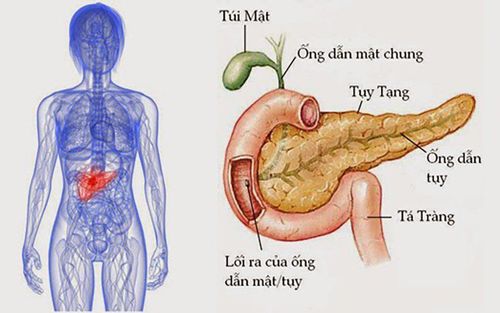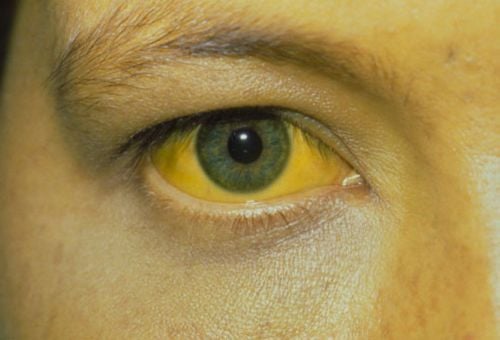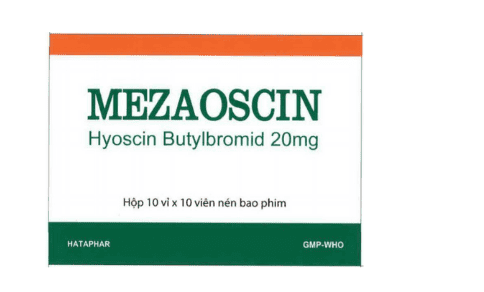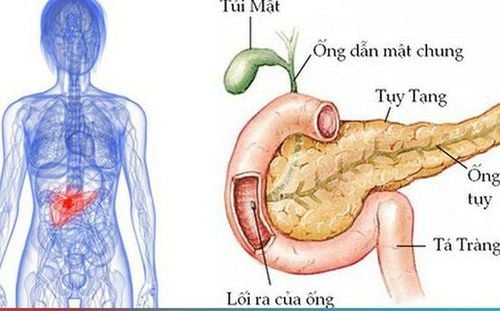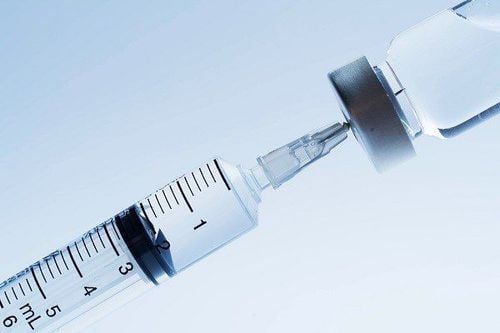This is an automatically translated article.
The article is written by Master, Doctor Mai Vien Phuong - Gastroenterologist - Department of Medical Examination & Internal Medicine - Vinmec Central Park International General Hospital.
Autoimmune pancreatitis is one of the human autoimmune diseases. The disease has only been discovered recently (previously often confused with other diseases), this finding has played an important role in making treatment more effective.
1. Immune chemokines as biomarkers in autoimmune pancreatitis and IgG4-RD
Autoimmune pancreatitis and systemic immunoglobulin G4-associated disease are characterized by Th2 responses. The prototypical Chemokine Th2, a thymic-regulating and activated chemokine, is also known as CCL17 (a well-established biomarker for atopic dermatitis). Since atopic dermatitis and G4 systemic immunoglobulin-associated disease share a Th2 response, it is possible that serum CCL17 levels could be a useful biomarker for systemic immunoglobulin-associated disease. G4 and autoimmune pancreatitis. Umeda et al explored the use of serum CCL17 levels as a possible biomarker for IgG4-RD. They found that serum CCL17 levels were significantly higher in patients with G4 systemic immunoglobulin-associated disease than in those with Sjogren's syndrome or in healthy controls. Although no association was observed between serum CCL17 and IgG4 Ab levels, CCL17 levels were positively correlated with the number of affected organs. However, the utility of immune chemokines as a biomarker for autoimmune pancreatitis has yet to be examined.
2. IFN-α factor production by pDCs is a prominent feature
Excessive IFN-α responses lead to the potent production of chemokines such as the motif chemokine ligands CXC 9 (CXCL9) and CXCL10. In fact, the development of experimental autoimmune pancreatitis is accompanied by increased expression of CXCL9 and CXCL10 in the pancreas. The utility of CXCL9 and CXCL10 as biomarkers for autoimmune pancreatitis and G4 systemic immunoglobulin-associated disease awaits future studies using samples from patients with autoimmune pancreatitis and IgG4-RD.
3. IgG1 instead of IgG4 plays a major pathogenic role in the development of autoimmune pancreatitis and IgG4-RD
Elevated IgG4 Ab response in autoimmune pancreatitis and G4 systemic immunoglobulin-associated disease is a manifestation associated with chronic inflammatory reactions. Therefore, new biomarkers based on an understanding of immune angiogenesis need to be established.
The authors recently found that IFN-α and IL-33-producing pDCs mediate experimental autoimmune pancreatitis and G4 systemic immunoglobulin-associated disease in humans. Interestingly, serum levels of IFN-α and IL-33 have been identified as potent biomarkers for the diagnosis and assessment of disease activity in autoimmune pancreatitis and IgG4-RD. Based on recently identified biomarkers of these disorders, the authors propose a diagnostic algorithm for patients with autoimmune pancreatitis and disease associated with elevated levels of systemic immunoglobulin G4. Serum IgG4 Ab levels are normal or slightly elevated. As shown in Figure 1, measurement of serum immunocytokine and autoAbs levels in combination with serum IgG4 Ab can be useful for the diagnosis of multiple autoimmune pancreatitis and IgG4-RD.
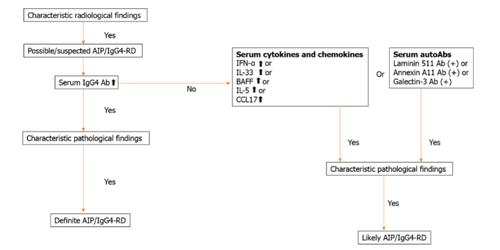
4. Conclusion
Autoimmune pancreatitis and G4 systemic immunoglobulin-associated disease are newly established disease entities. Both of these disorders are characterized by elevated serum IgG4 Ab levels and accumulation of IgG4-expressing plasma cells in the affected organs. Furthermore, induction of remission by prednisolone was accompanied by a marked reduction in serum IgG4 Ab levels in patients with autoimmune pancreatitis and IgG4-RD. Therefore, the serum level of this IgG subclass is certainly a useful biomarker for both diagnosis and assessment of disease activity. However, a significant portion of patients with autoimmune pancreatitis present with active disease even at normal serum IgG4 Ab levels.
As our knowledge about the immunogenicity of autoimmune pancreatitis and systemic immunoglobulin G4-associated disease increases, more biomarkers are likely to be identified in the future. The discovery of such biomarkers will contribute to clinical practice and further underpin autoimmune pancreatitis and IgG4-RD and cytokines.
Please dial HOTLINE for more information or register for an appointment HERE. Download MyVinmec app to make appointments faster and to manage your bookings easily.
References:
Hara A, Watanabe T, Minaga K, Yoshikawa T, Kamata K, Kudo M. Biomarkers in autoimmune pancreatitis and immunoglobulin G4-related disease. World J Gastroenterol 2021; 27(19): 2257-2269 [DOI: 10.3748/wjg.v27.i19.2257]
Kamisawa T , Chari ST, Lerch MM, Kim MH, Gress TM, Shimosegawa T. Recent advances in autoimmune pancreatitis : type 1 and type 2. Intestines . Year 2013; 62 : 1373-1380. [ PubMed ] [ DOI ] [ Citation in this article: 1 ] [ Citation in CrossRef: 116]
Kamisawa T , Zen Y, Pillai S, Stone JH. Diseases associated with IgG4. Lance . 2015; 385 : 1460-1471. [ PubMed ] [ DOI ] [ Citation in this article: 12 ] [ Citation in CrossRef: 593 ]





